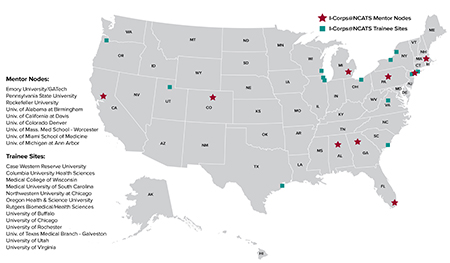Media contact: Adam Pope

Click image to enlargeThe National Center for Advancing Translational Science has awarded the Center for Clinical & Translational Science at the University of Alabama at Birmingham over $3.1 million to help grow the reach of a national program designed to help scientists translate their discoveries to the marketplace. The I-Corps@ NCATS program is a 5-week short course which combines business model training with a customer discovery process.
The CCTS will use the funding to enhance the process of scientific translation by taking the demonstrated lessons learned and best practices from the I-Corps@NCATS program and disseminating them across a wider network of Clinical and Translational Science Awards hubs.
The short course, based upon the successful National Science Foundation I-Corps and I-Corps at NIH Entrepreneurial Training Program, helps prepare teams to apply to go on to a national program at the National Science Foundation or the National Institutes of Health.
With the new award secured, the I-Corps@NCATS network will expand from the original cohort to thirteen additional, regionally-dispersed CTSA hubs, bringing the total number of trained CTSAs to 22. The program will be accessible to investigators from any CTSA program across the country and will reach more than 800 academic researchers
Molly Wasko, Ph.D. associate dean of Research, Innovation & Entrepreneurship and Faculty Success for the Collat School of Business and CCTS executive committee member, will lead the dissemination effort through a “see one, do one” train-the-trainer approach, designed to better support the translation of biomedical discoveries on campuses into commercially successful innovations with clinical applications.
“Our goal is to improve the health of our communities by speeding up the process of moving new discoveries from our research labs into new treatments and cures for patients,” said Wasko. “We do this by helping our academic researchers better understand the process for how to bring a new innovation to market and how to accelerate the process while reducing the risk that an innovation will fail. We explore the questions ‘who is the customer for your science, and why do they care about your solution’.”
Wasko was project lead for the I-Corps@NCATS Pilot Program in 2016. She worked with a team from nine other medical institutions who trained 150 academic researchers organized into 62 teams, of whom nine went on to form companies to commercialize their ideas.
One such researcher is Andrew Smith, vice chair of clinical research and professor of Radiology at UAB. Smith is also the founder of AI Metrics, LLC, a startup that leverages artificial intelligence to assist with medical image interpretation and reporting.
“The I-Corps@NCATS experience was a critical component for our customer discovery, allowing us to better direct our efforts towards what the customer really wanted rather than forcing a product of our own design to a market that may not have accepted it,” said Smith. “My team has continued using what learned as we begin our sales cycle and enter the market.”
